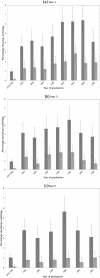Career choices for cardiology: cohort studies of UK medical graduates
- PMID: 23351301
- PMCID: PMC3579736
- DOI: 10.1186/1472-6920-13-10
Career choices for cardiology: cohort studies of UK medical graduates
Abstract
Background: Cardiology is one of the most popular of the hospital medical specialties in the UK. It is also a highly competitive specialty in respect of the availability of higher specialty training posts. Our aims are to describe doctors' early intentions about seeking careers in cardiology, to report on when decisions about seeking a career in cardiology are made, to compare differences between men and women doctors in the choice of cardiology, and to compare early career choices with later specialty destinations.
Methods: Questionnaire surveys were sent to all UK medical graduates in selected qualification years from 1974-2009, at 1, 3, 5, 7 and 10 years after graduation.
Results: One year after graduation, the percentage of doctors specifying cardiology as their first choice of long-term career rose from the mid-1990s from 2.4% (1993 cohort) to 4.2% (2005 cohort) but then fell back to 2.7% (2009 cohort). Men were more likely to give cardiology as their first choice than women (eg 4.1% of men and 1.9% of women in the 2009 cohort). The percentage of doctors who gave cardiology as their first choice of career declined between years one and five after qualification: the fall was more marked for women. 34% of respondents who specified cardiology as their sole first choice of career one year post-graduation were later working in cardiology. 24% of doctors practising as cardiologists several years after qualification had given cardiology as their sole first choice in year one. The doctors' 'domestic circumstances' were a relatively unimportant influence on specialty choice for aspiring cardiologists, while 'enthusiasm/commitment', 'financial prospects', 'experiences of the job so far' and 'a particular teacher/department' were important.
Conclusions: Cardiology grew as a first preference one year after graduation to 2005 but is now falling. It consistently attracts a higher percentage of men than women doctors. The correspondence between early choice and later destination was not particularly strong for cardiology, and was less strong than that for several other specialties.
Figures
References
-
- Royal College of Physicians. ST3 recruitment: competition ratios 2011. 2011. http://www.st3recruitment.org.uk.
-
- Jaques H. Cardiology is most competitive specialty for higher training. http://careers.bmj.com/careers/advice/view-article.html?id=20004464.
-
- Royal College of Physicians. Census of consultant physicians in the UK, 2010. London: The Federation of the Royal Colleges of Physicians of the United Kingdom; 2011.
-
- Graham MM, Kells CM. The girls in the boys' club: reflections from Canadian women in cardiology. Can J Cardiol. 2005;21:1163–1164. - PubMed
Publication types
MeSH terms
LinkOut - more resources
Full Text Sources
Other Literature Sources


